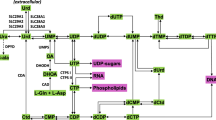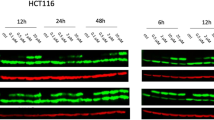Abstract
Purpose: We studied the effects of purine depletion on the cell cycle using a specific inhibitor of de novo purine biosynthesis, AG2034, an inhibitor of glycinamide ribonucleotide formyltransferase (GARFT). Methods: Cytotoxicity was determined by clonogenic assays, and cell cycle perturbations by flow cytometry. Ribonucleotide pools were measured by anion exchange high-pressure liquid chromatography, and DNA strand-breaks were determined by alkaline elution and by the TUNEL assay. Results: When cells were maintained in standard tissue culture medium, which contained 2.2 μM folic acid, AG2034 was cytostatic in all the cell lines tested. Under low-folate conditions (50 nM folic acid), AG2034 caused up to 50% cell death in cell lines that possessed a functional G1 checkpoint (A549, MCF-7), but was only cytostatic to the remaining cells, even at very high concentrations (100 μM ). In contrast, AG2034 at 10 nM or 100 nM killed all the cells in cultures of HeLa/S3 or SW480 cells, which lack a functional G1 checkpoint. Flow cytometry studies indicated that in G1 checkpoint-competent cells, AG2034 caused a G1 arrest. Those cells (up to 50%) that were already in S phase died, but the cells that were in G1 arrest maintained viability, based upon clonogenic assays, for many days. In G1 checkpoint-deficient cells, no G1 arrest was seen after AG2034 treatment, all cells progressed into S phase, and all cells died. Measurement of DNA strand-breaks, either by alkaline elution or by the dUTP end-labelling technique, indicated no DNA strand-breaks 24 h after AG2034 treatment, indicating that purine nucleotide depletion can trigger the G1 checkpoint in the absence of DNA damage. Conclusion: Purine depletion causes slow cell death in cells that have passed the G1 checkpoint, but cytostasis in cells that are arrested at the G1 checkpoint. The GARFT inhibitor, at physiological folate concentrations, thus causes selective cytotoxicity to cells lacking a functional G1 checkpoint.
Similar content being viewed by others
Author information
Authors and Affiliations
Additional information
Received: 8 May 1997 / Accepted: 26 June 1997
Rights and permissions
About this article
Cite this article
Zhang, C., Boritzki, T. & Jackson, R. An inhibitor of glycinamide ribonucleotide formyltransferase is selectively cytotoxic to cells that lack a functional G1 checkpoint. Cancer Chemother Pharmacol 41, 223–228 (1997). https://doi.org/10.1007/s002800050732
Issue Date:
DOI: https://doi.org/10.1007/s002800050732




